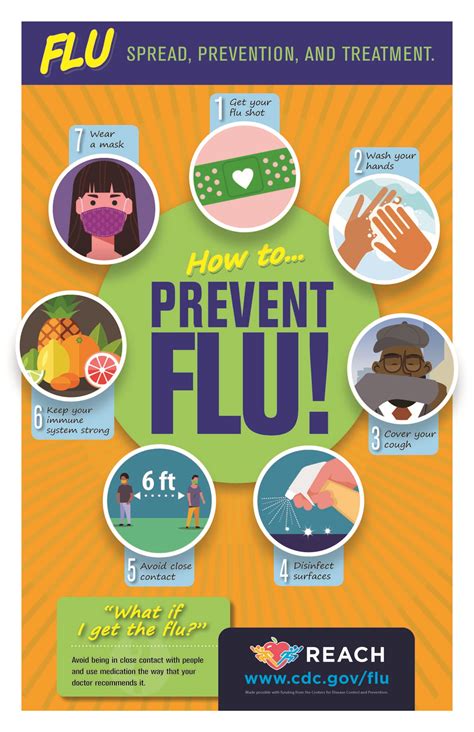12+ Ways To Prevent Flu Season 2024 Outbreaks

As the world prepares for the upcoming flu season in 2024, it’s essential to take proactive measures to prevent outbreaks and protect public health. The flu, also known as influenza, is a contagious respiratory illness caused by influenza viruses, which can lead to severe complications, especially among vulnerable populations such as the elderly, young children, and people with certain chronic health conditions. In this article, we’ll explore 12+ ways to prevent flu season 2024 outbreaks, including strategies for individuals, communities, and healthcare systems.
Understanding the Flu Virus
Before we dive into prevention strategies, it’s crucial to understand the flu virus and how it spreads. The flu virus is highly contagious and can be spread through the air when an infected person talks, coughs, or sneezes, releasing droplets that contain the virus. These droplets can land in the mouths or noses of people nearby or be inhaled into the lungs. The flu virus can also spread by touching surfaces or objects that have the virus on them and then touching one’s mouth, nose, or eyes.
1. Get Vaccinated
The most effective way to prevent flu outbreaks is by getting vaccinated. The flu vaccine is updated annually to protect against the most common strains of the virus, and it’s recommended that everyone 6 months and older gets vaccinated. The vaccine is especially important for high-risk groups, such as pregnant women, young children, and people with certain chronic health conditions. According to the Centers for Disease Control and Prevention (CDC), the flu vaccine can reduce the risk of flu illness by 40-60% among the general population.
2. Practice Good Hygiene
Good hygiene practices, such as frequent handwashing, covering your mouth and nose when coughing or sneezing, and avoiding close contact with people who are sick, can help prevent the spread of the flu virus. It’s essential to wash your hands with soap and water for at least 20 seconds, especially after using the bathroom, before eating, and after blowing your nose, coughing or sneezing.
3. Stay Home When Sick
If you’re experiencing flu-like symptoms, such as fever, cough, sore throat, and body aches, it’s essential to stay home from work or school to prevent spreading the virus to others. The CDC recommends that people with the flu stay home for at least 24 hours after their fever is gone without the use of fever-reducing medications.
4. Avoid Close Contact
Avoiding close contact with people who are sick can help prevent the spread of the flu virus. This includes avoiding sharing food, drinks, or utensils with people who are sick, as well as avoiding touching your eyes, nose, and mouth, which can spread the virus.
5. Keep Surfaces Clean
Keeping surfaces clean, especially in high-traffic areas, can help prevent the spread of the flu virus. This includes regularly disinfecting surfaces, such as doorknobs, light switches, and countertops, with a solution that contains bleach or other disinfectants.
6. Improve Indoor Air Quality
Improving indoor air quality can help reduce the transmission of the flu virus. This can be achieved by using air purifiers, increasing ventilation, and avoiding overcrowding in indoor spaces.
7. Stay Healthy
Staying healthy through a balanced diet, regular exercise, and adequate sleep can help boost your immune system, making you less susceptible to the flu virus. A healthy diet rich in fruits, vegetables, and whole grains can provide essential vitamins and minerals that help support immune function.
8. Avoid Stress
Chronic stress can weaken your immune system, making you more vulnerable to the flu virus. Engaging in stress-reducing activities, such as meditation, yoga, or deep breathing exercises, can help mitigate the negative effects of stress on your immune system.
9. Get Enough Sleep
Getting enough sleep is essential for maintaining a healthy immune system. Aim for 7-9 hours of sleep per night to help your body repair and recharge.
10. Stay Hydrated
Staying hydrated by drinking plenty of fluids, such as water, herbal tea, or clear broths, can help thin out mucus, making it easier to expel, and keep your respiratory system functioning properly.
11. Consider Antiviral Medications
If you’re at high risk of developing complications from the flu, such as pneumonia, your doctor may prescribe antiviral medications, such as oseltamivir (Tamiflu) or zanamivir (Relenza), to help prevent or treat the flu.
12. Support Community-Based Initiatives
Supporting community-based initiatives, such as flu vaccination clinics, can help promote public health and prevent flu outbreaks. These initiatives can provide education, resources, and access to flu vaccines, especially for vulnerable populations.
Additional Strategies
In addition to these 12 strategies, there are several other ways to prevent flu season 2024 outbreaks, including:
- Implementing workplace wellness programs that promote flu vaccination, flexible sick leave policies, and healthy habits
- Developing school-based initiatives that educate students, teachers, and staff about flu prevention and vaccination
- Creating community-based coalitions that bring together healthcare providers, public health officials, and community leaders to promote flu prevention and vaccination
- Utilizing digital health technologies, such as telemedicine and mobile apps, to promote flu prevention and vaccination, as well as provide remote monitoring and treatment for people with the flu
What are the symptoms of the flu?
+The symptoms of the flu can include fever, cough, sore throat, body aches, fatigue, and headache. In severe cases, the flu can lead to complications, such as pneumonia, bronchitis, and sinus and ear infections.
Who is at high risk of developing complications from the flu?
+People who are at high risk of developing complications from the flu include older adults, young children, pregnant women, and people with certain chronic health conditions, such as heart disease, lung disease, and diabetes.
How effective is the flu vaccine?
+The flu vaccine can reduce the risk of flu illness by 40-60% among the general population. However, the effectiveness of the vaccine can vary depending on factors, such as the age and health status of the individual, as well as the type of flu virus that is circulating.
In conclusion, preventing flu season 2024 outbreaks requires a multi-faceted approach that includes individual, community, and healthcare system strategies. By following these 12+ ways to prevent flu outbreaks, we can reduce the transmission of the flu virus, protect public health, and prevent unnecessary hospitalizations and deaths. Remember, prevention is the best medicine, and taking proactive measures to prevent the flu can help keep you and your loved ones healthy and safe throughout the flu season.



